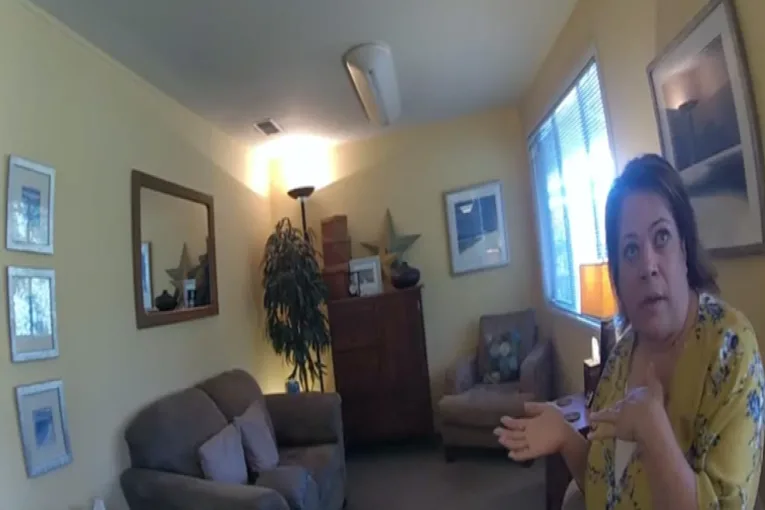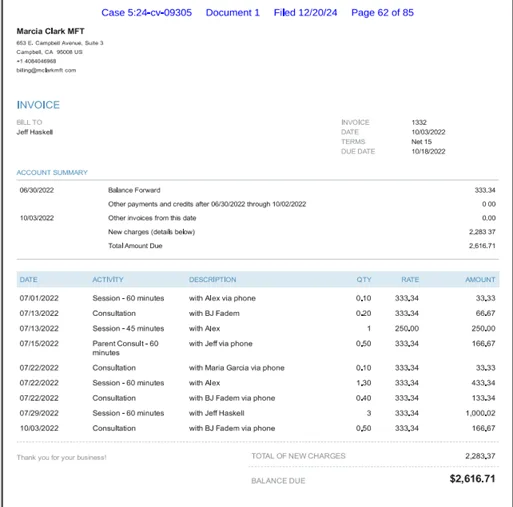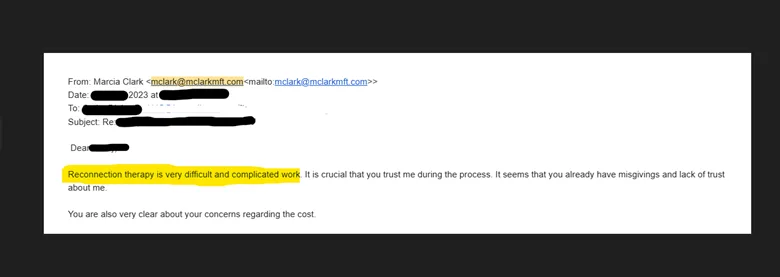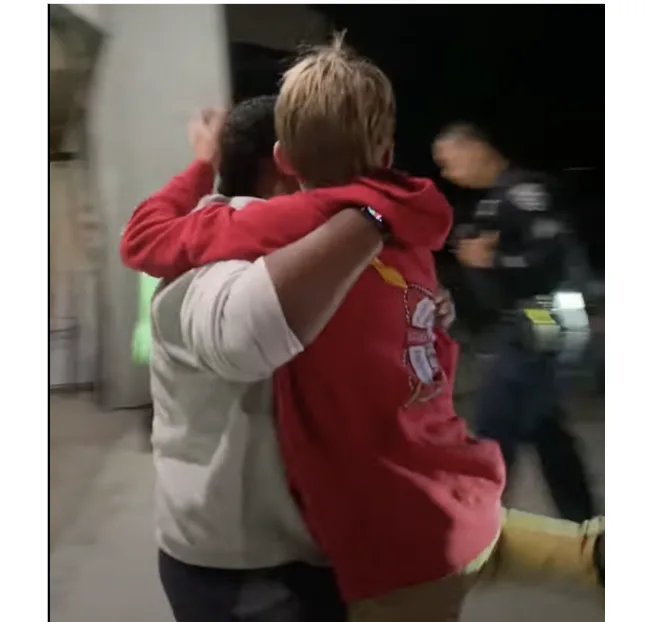
A federal lawsuit filed in San Jose the week before Christmas takes aim at two attorneys who are frequently appointed as minor’s counsel to represent children during their parents’ divorce and custody disputes in Santa Clara County Superior Court. The lawsuit also implicates a “reunification therapist,” who doubled as a professional, for-profit, supervised visitation provider.
Since 2012, our team has reported on family courts across California, tackling some of the most controversial aspects of the system, including child custody disputes where a parent is only allowed contact with their child while a court approved supervisor is present. At the whim of a family court judge, that supervisor can be a grandparent, family friend, or a for-profit third party charging $50 to 150 per hour for parents to see, speak with and hug their own children.

Divorced Parents Court Ordered to Pay to See Their Own Kids
In Contra Costa County, a mother spent eight years on supervised visits with her two children. She recalled that one year when she had lost her job and could not afford to pay her mortgage, family court orders required her to pay a professional supervised visitation provider $583 to celebrate her youngest son’s birthday, which she could not afford.
In San Francisco, a mother placed on for-profit supervision, was subject to stringent and invasive restrictions. She and her parents were prohibited from taking photos, recording videos, or bringing homecooked food to visits. Further, the visitation provider was ordered to inspect and ensure any food brought to visits was pre-packaged and sealed. Additionally, the mother and child’s grandparents were forbidden from speaking to the child in their native language because the supervisor could not understand it.
During the recent holiday season, a mother in California’s Silicon Valley, spent her 2-hour visit with her daughter, baking cookies while being monitored by a visitation provider at $50 per hour. In a supervised video call with her daughter later that same week, the child announced her paternal grandmother had thrown the cookies away after the child returned home to her father.
A therapist from Santa Clara County, who wished to remain anonymous out of fear of retaliation, argued that prolonged supervised visits are not helpful. Instead, they often leave children with the impression that one parent is “bad” or did something wrong.
Out-of-Touch Family Court Judges
Family court judges frequently order supervised visitation after one parent files a restraining order request. In such cases, for-profit visitation orders are often recommended by court-appointed children’s lawyers, known as minor’s counsel or GALs (Guardians ad Litem).
It is heart-wrenching to hear parents describe how they are unable to afford time with their children on special occasions, such as birthdays and Christmas, due to the exorbitant fees charged by Professional Visitation Providers, whose payments are assured by family court orders.
Judges have played a role in perpetuating these practices, allowing the actions of professional supervised visitation providers to go unchecked. For-profit providers often prioritize their financial interests—or those of the family court industrial complex—over the best interests of children.

High-Priced Family Court Babysitter at the Center of Federal Lawsuit
In the family law case at the root of the federal lawsuit, “reunification” therapist Marcia Clark, charged over $2,600 for so-called therapy while doubling as a supervised visitation provider. The father did not see his children during the billing period. However, Clark’s bill, attached to the federal lawsuit, shows Clark billed for time she spent speaking with minor’s counsel, B.J. Fadem, who is also named in the lawsuit.

Lucrative Loopholes in California’s Family Code
In California, Family Code section 3190 permits judges to require parents and minor children to participate in outpatient counseling with a mental health provider for up to one year. However, attorneys and minor’s counsel often circumvent this law by pressuring parents to “stipulate,” or agree, to use of a therapist, which can extend indefinitely.
This practice is key in the new federal lawsuit, where divorce attorneys Walter Hammon and Christina Adames pressured the parents to agree to use therapist Marcia Clark for “reconnection” of a father and his children after a restraining order had placed the father on a “no contact” family court order with his son and daughter.
“Reunification” therapist Marcia Clark spent three years on the case, charging the father for services that yielded no results. A year into the case, Clark claimed the children were self-harming and suicidal, but never reported these behaviors to authorities, despite being a mandated reporter. Clark, along with minor’s counsel B.J. Fadem, also asserted that the father’s 11-year-old daughter was transgender—a claim the lawsuit alleges was false.
Minor’s counsel Nicole Ford, who had no legal connection to the case, is named in the lawsuit. She allegedly violated federal HIPAA laws after revealing confidential information about the father and his children when she was not legally involved.
Parents paying for what many consider “junk science” therapy often complain that court-approved professionals are not within their healthcare networks, making the cost of family court ordered therapy ineligible for insurance reimbursement.

Reunification Therapy Reform Efforts
Reunification therapy, a gateway to reunification camps, was outlawed in California with the passage of Piqui’s Law, effective January 1, 2024.
In New Hampshire, a law that took effect in July 2024, goes further and prohibits judges from ordering family reunification treatments or services, such as camps, workshops, therapeutic vacations, or educational programs, that involve, or result in:
- A no-contact order.
- Overnight, out-of-state, or multi-day stays.
- Transfers of physical or legal custody of the child.
- Private youth transporters or agents who use force, threats, or distressing methods that endanger a child’s safety.
- Threats, coercion, verbal abuse, or isolation from family and community.
These reforms were spurred by high-profile cases including one in Santa Cruz, where Maya and Sebastian were forcibly removed from their grandmother’s home and taken to Los Angeles for reunification “camp.” Viral video of private transport agents violently removing the children garnered widespread attention on social media back in 2022. Attention that resulted in changes in local ordinances and state law.

Escalating Conflicts: The “Golden Ticket” for Junk Science
Court observers opine that attorneys often escalate conflicts in cases involving substantial private assets or access to federal funds, which serve as a “golden ticket” for continued involvement. This includes imposing supervised visitation and therapy orders with no defined benchmarks for success—a practice critics often label as junk science.
This new federal lawsuit, brought by Orange County attorney Patrick Evans on behalf of a father who has not had unsupervised time with his children since 2019, challenges the constitutionality of supervised visitation fees and fines that restrict parents and children from spending time together.
“Instead of fostering healthy relationships, family court practices too often destroy parent-child bonds and derail childhoods, leaving families and futures shattered, “ Evans said.
Editor’s Appeal: If our reporting has provided information on Family Court issues you have not found elsewhere, please support this important work as there is much left to do in 2025. Your donation before December 31, 2024, will make this important reporting possible. Before closing this article, please click this link to show your support.